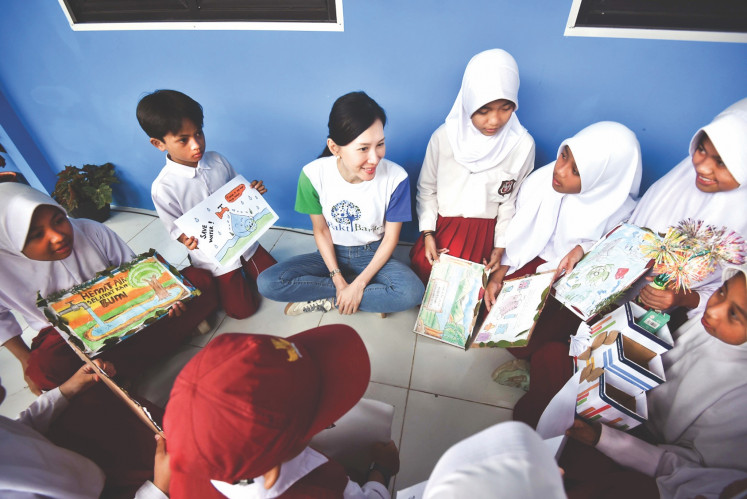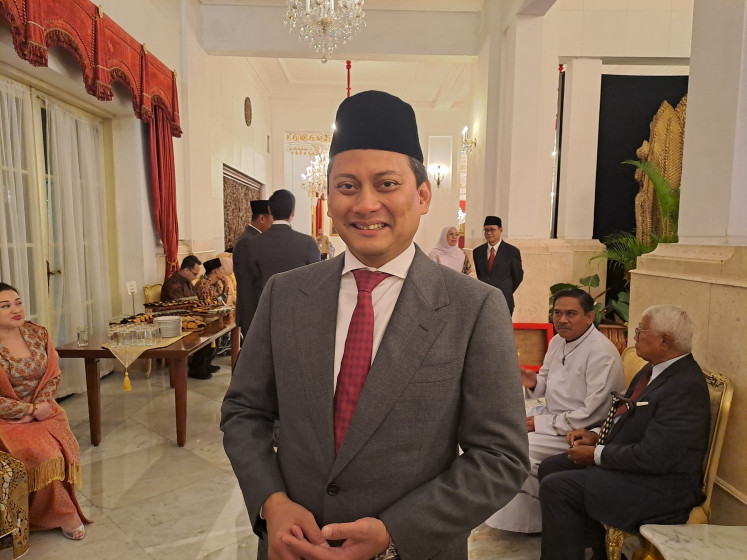Popular Reads
Top Results
Can't find what you're looking for?
View all search resultsPopular Reads
Top Results
Can't find what you're looking for?
View all search resultsA mile in their shoes
Special kids: This little boy is enjoying school and learning well, despite his intellectual disability
Change text size
Gift Premium Articles
to Anyone
Special kids: This little boy is enjoying school and learning well, despite his intellectual disability.
Shock, embarrassment and confusion wash across the faces of the two dozen people seated on floor mats at the opening of a recent teachers' workshop in Pajeng, Gianyar.
Commands are given in Dutch, a language less known in this village on the outskirts of Ubud than the English so commonly heard in the tourist town.
Marieke Nijland and Mila van der Meer, the facilitators of the workshop, which was designed for teachers of students with learning difficulties, say that the use of a foreign language instantly places teachers in a position frequently faced by intellectually disabled students.
'The teachers step into the world of an intellectually disabled child, who often come into a situation where they don't understand the world,' says Mila.
Commands are given repeatedly and brusquely in the first phase of the exercise, according to Mila.
'We ask one person to do something in Dutch, repeating this and growing verbally more frustrated as they do not understand. In this way the teachers can really feel what it is like for a child who does not understand directions,' says Mila.
Marieke says the next step is to repeat the command in the foreign language, this time in a friendly, comforting voice accompanied by body language that reinforces the direction.
New methods: Mila van der Meer (rear left) and Marieke Nijland (rear right)of Sukacita foundation share new teaching methods and ideas with Balinese teachers.
'We keep repeating the direction is a friendly voice with body language and voice intonation until they understand the instruction,' Marieke says. 'In this way, teachers learn they can instruct children with disabilities ' even when the child does not understand the words. Body language changes how teachers and intellectually challenged students communicate.'
Trained the Netherlands as a special-needs teacher, Marieke says she feels she can share some of her skills. Meanwhile, Mila trained as a social worker for the parents of disabled children.
Setting up a foundation, Sukacita, the women have trained three local teachers to work at Widya Gupta, a small school in Tengkulak where children with disabilities can learn in a supportive and informed environment.
Head teacher Gusti Putu Parmiti says the school began accepting students with intellectual disabilities a year ago, with methodology input from Mila and Marieke.
'One issue here [in Indonesia] is that some people believe if you really push a child to read, write and count, they will eventually learn and that is frustrating for the child. There is a lack of understanding of what an intellectual disability is,' Mila says. 'When a child is blind or deaf it is obvious, but that is not so with intellectual disabilities.'
Marieke echoed Mila's comments. 'Often these intellectual problems cannot be seen from the outside ' and if you can't see, how can you know there is a problem without information?'
The women have also written a book, sponsored by the Suriani Institute on intellectual disabilities, titled Anak Unik (Unique Child), which guides parents and teachers in understanding intellectual disabilities and methods to ameliorate frustrations and difficulties in raising and teaching these 'unique' children.
One on one: Some one on one time with a friendly, supportive teacher makes huge difference for kids with intellectual disabilities.
Staggeringly, Mila says that a reason for a child's intellectual disability is obvious in only 50 percent of cases. 'This fact is [true] not only in Indonesia, but in countries like Holland as well.'
Such information can help relieve the guilt and fear some parents might feel when learning of their child's disability.
'Parents here in Indonesia ask if we have these kids of children in Holland,' Mila said. 'Yes we do, and is there medicine to cure this there? No, there is not. In the same way as blindness or deafness, it is there forever.'
Simple issues such as reducing sugar for hyperactive children are raised by people in the workshop. A teacher from Saraswati Primary school in Sukawati, Ayu Laksmi, says many parents do not know that sugar impacts their hyperactive children.
'We have one child who is hyperactive and does not understand what we want in class. We taught ourselves how to teach this child, and through this workshop we can feel that all children are special and little things like sugar is information we can share with parents. I personally feel Indonesia has a lot to learn about intellectual disability, so I value this workshop,'
says Ayu.
The Culture and Elementary and Secondary Education Ministry's current push for 'inclusive schools' underscores the need for the workshops offered by Mila and Marieke.
'Most kids with intellectual disabilities go to normal schools ' but often they will sit in the back year after year, particularly those with mild disabilities, who can hide their problems,' says Marieke.
There are only nine schools dedicated to children with intellectual disabilities in Bali, she adds.
'There is a need to teach the teachers how to teach these kids. When we see the whole of Indonesia, the first step for these kids is that they are welcome in the world, that they are unique. With awareness and understanding, change comes,' says Marieke, who with Mila, is sharing insight, skill and love for these special children with Indonesia's teachers.
I am unique: Having a learning difficulty is not holding back this little boy.
' Photos by J. B. Djwan.














